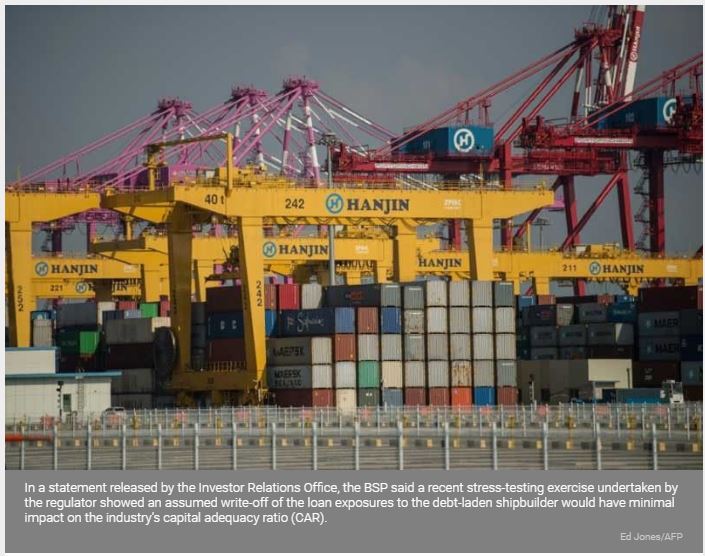Philippines: BSP stress test shows minimal bank impact of Hanjin debt woes
MANILA, Philippines — The Bangko Sentral ng Pilipinas (BSP) said yesterday the failure of Korean shipbuilder Hanjin Heavy Industries and Construction Philippines (HHIC-Phil) to settle its obligations to five of the largest banks in the Philippines worth over P21 billion would have minimal impact on the capitalization of the banking industry.
In a statement released by the Investor Relations Office, the BSP said a recent stress-testing exercise undertaken by the regulator showed an assumed write-off of the loan exposures to the debt-laden shipbuilder would have minimal impact on the industry’s capital adequacy ratio (CAR).
The central bank said the local banking industry is well-capitalized with a CAR of 15.36 percent as of end-September, well above the international standard of eight percent and the BSP’s regulatory requirement of 10 percent.
“With more than adequate capital base, the banking system continues to post strong core earnings. As of end-September 2018, the banking system’s net profit grew by 5.8 percent compared to the previous year’s level. Moreover, the industry remains liquid,” it said.
As of end-September, the liquidity coverage ratio of big banks stood at 157.6 percent on solo basis, well above the current regulatory threshold of 100 percent.
As part of the supervisory process, the BSP requires banks to stress test their own loan portfolios.
“In this respect, banks should have the capability to promptly address threats and stress scenarios,” the BSP said.
Based on the latest data, the BSP is confident about the local banks’ ability to manage this specific challenge.
“They are also equipped to handle the negotiations required to complete Hanjin’s corporate restructuring while remaining compliant with prudential regulations,” it said.
Over the past 20 years, the central bank has been implementing strategic reforms that have resulted in higher capitalization and stronger risk management systems to manage potential threats.
Latest data showed the industry’s total assets grew by 11 percent in 2018, the bulk of which have been largely channeled to production loans.
“These guidelines set a higher standard in managing risk arising from the banks’ lending operations. The CRM guidelines also require banks to set aside allowance for expected credit losses, prompting them to be cognizant of potential losses in their loan portfolio even at an early stage,” it said.
This resulted in strong asset quality as indicated by the decline in banks’ non-performing loans (NPLs) ratio to 1.83 percent while loan loss provisioning exceeding 100 percent as of end-October.
“With its robust capitalization and sufficient liquidity buffer, the Philippine banking system is therefore well-positioned to manage about $400 million in loan exposure to HHIC-Phil,” the BSP said.
According to the central bank, the loan exposure represents only 0.24 percent of total loans of the banking system and 2.49 percent of the foreign currency loans of foreign currency deposit units (FCDUs).
The BSP said it would continue to remain vigilant in monitoring the actions taken by the banks and ensure the orderly resolution of the Hanjin case.
“While Hanjin PH’s closure comes with some challenges, it remains a non-systemic event as substantiated by data from the BSP. Overall, there is optimism that the Government’s commitment to present reforms – particularly its Build, Build, Build agenda, which will bring about job creation and investment growth, tax reform, and ease of doing business initiatives – keeps the Philippine on track as one of the fastest growing economies in the fastest growing region of the world,” the BSP said.
The country’s largest banks led by BDO Unibank, Metropolitan Bank & Trust Co. (Metrobank), Land Bank of the Philippines, Bank of the Philippine Islands (BPI), and Rizal Commercial Banking Corp. (RCBC) have a combined exposure of more than $400 million to HHIC-Phil.
RCBC has the biggest exposure with $145 million followed by Landbank with $80 million, Metrobank with $72 million, BDO with $60 million, and BPI with $52 million.
Source: https://www.philstar.com/business/2019/01/17/1885632/bsp-stress-test-shows-minimal-bank-impact-hanjin-debt-woes#HMDxcRkY8alyZbxV.99


 English
English




